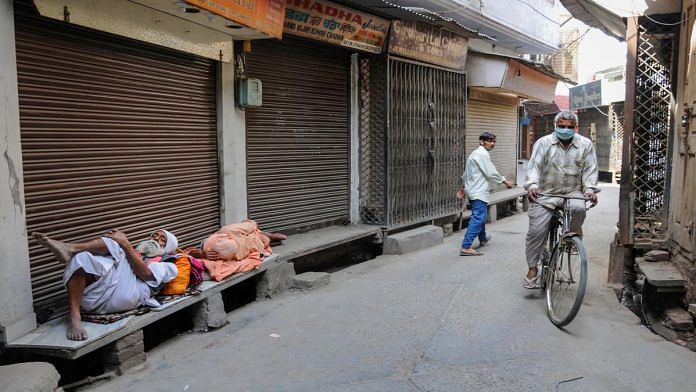The key strategy is fiscal empowerment of States
M. Govinda Rao | Member, Fourteenth Finance Commission & former Director, National Institute of Public Finance and Policy
The Hindu
Rao argues that the central government should recognise that winning the Covid-19 war is linked to states having sufficient resources. But even in national lockdown 2.0, there’s no clarity on the time “it will take to get out of the crisis, the extent of damage it will inflict, and the cost of relief and rehabilitation required”. Rao examines three key steps to revive fiscal empowerment of states — relief measures by relaxation in the states’ fiscal deficit limit, focusing on health & economy, and helping states by allowing additional borrowing space.
Minimise democracy, maximise interfaith distance, maintain aloofness from poor — may be the new normal
Suhas Palshikar | Chief editor of Studies in Indian Politics
The Indian Express
Palshikar says that had the nationwide lockdown been a “success”, as is being claimed by many, there wouldn’t have been an extension. “The frightening success of the lockdown is the willingness of the entire ruling class and the articulate public in the gigantic suspension of democracy,” he writes. The Indian middle class supports the lockdown not just due its gullibility but also because of its “complete lack of social connection to anything beyond itself.” He argues that the new normal after lockdown includes sharper class-chasm by maintaining aloofness from the poor, maximised interfaith distance and minimised democracy.
An agenda for a fightback
Shashank Joshi | Dean of Indian College of Physicians, Mumbai
The Indian Express
Joshi writes that Indians must cooperate to show the world that the war against coronavirus can be won, just like the eradication of smallpox and polio. Joshi chalks out a plan to fight the virus — follow social distancing till next year, maximum hygiene, give up tobacco and alcohol addictions, avoid refrigerated food, protect the vulnerable, like senior citizens and those with hypertension or other heart conditions, provide healthcare staff with PPE kits, food and rest. Also, the government must ensure ration for all and introduce new laws against rumour mongering and cybercrime.
The US presidential election match-up is welcome news for India
Frank F. Islam | Entrepreneur, civic leader, & thought leader based in Washington DC
Hindustan Times
Islam writes that if Democratic candidate Joe Biden wins the US presidential elections, it is good for India as he has been well disposed to the country, previously. Frank says that BernieSanders, the other major Democratic aspirant doesn’t have a strong history of support for India but the Trump-Biden match-up is good news for India. However, Islam argues that between both the contenders, Biden will be a more steady partner as he will try to bring together countries to discuss consequences of Covid-19 and to leverage resources for the benefit of all nations.
Kerala’s approach to containing corona
Madhura Swaminathan | Professor
Deepak Johnson | Research Fellow, Indian Statistical Institute, Bengaluru
Business Standard
Swaminathan and Johnson assert that Kerala hasn’t just flattened the curve, but has done so with a low mortality rate of 0.5 per cent. The key elements to Kerala’s approach were developing an “air-tight health protocol” for isolating and tracing contacts, assuring necessary food and essentials to everyone, providing income support to those affected by economic slump and mobilising all sections of society.
Beyond the Covid-19 red zones
Jyoti Mukul | Journalist
Business Standard
Mukul notes that so far there is no government study that looks at why particular areas are more prone to Covid-19 infections. However, she notes that existing government data indicates that most patients that died of coronavirus also had comorbidities — pre-existing medical conditions that exacerbate the effect of the virus. She argues that while a lockdown will check the spread of the virus, risk assessment of communities is essential before full movement of people can be allowed.
How easing lockdown rules will impact workers and companies
KR Shyam Sundar | Professor, Xavier School of Management. Jamshedpur
The Hindu Business Line
The easing of lockdown will offer opportunities to workers dependent on daily wages. However, Sundar argues that migrant workers in urban spaces may not gain immediately as more work opportunities will come up in rural areas owing to “near-universal” clearance of economic activities in that area. He argues that the management of different companies must consult trade unions. Non-employable workers should be provided with full income with the condition that they will work overtime to compensate for wages.
The migrant knock
Yogesh Suri | Senior Advisor, NITI Aayog
Satwik Mishra | Young Professional, NITI Aayog
The Financial Express
Suri and Mishra assert that there are unintended consequences of the lockdown that need to be addressed. One of them is the food security challenges faced by migrant workers. They argue that state governments must “aggressively ” build their capacities to ensure that migrant workers can be self-identified to augment the beneficiary list under PDS (Public Distribution System). Moreover, they must set up institutional mechanisms that migrant workers can approach to access PDS benefits.
Today’s Editorials
The Indian Express: Kashmiri journalist Masrat Zahara being booked under the Unlawful Activities (Prevention) Act sends out a chilling message on free speech to journalists across the country, writes Express. It only confirms that curbs on Internet access may have been eased since 5 August 2019, but little has changed when it comes to securing the rights of the press, it writes.
The Hindu: The unprecedented plunge in oil prices is not good news for India,writes Hindu. It says that while the sliding oil prices would help significantly pare down India’s energy import bill, a protracted demand drought would end up hurting the government’s tax revenues especially at a time when it badly needs every additional rupee it can garner.



